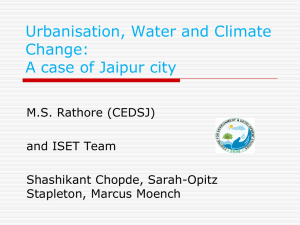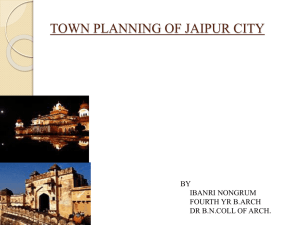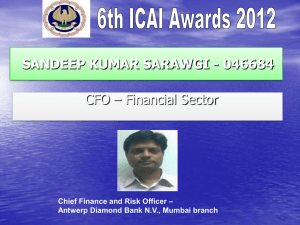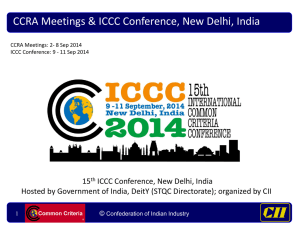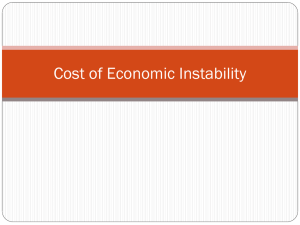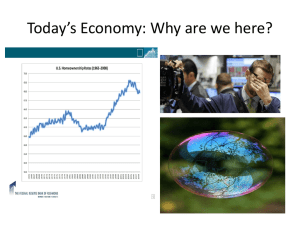- Jaipur Branch of CIRC of ICAI, Jaipur
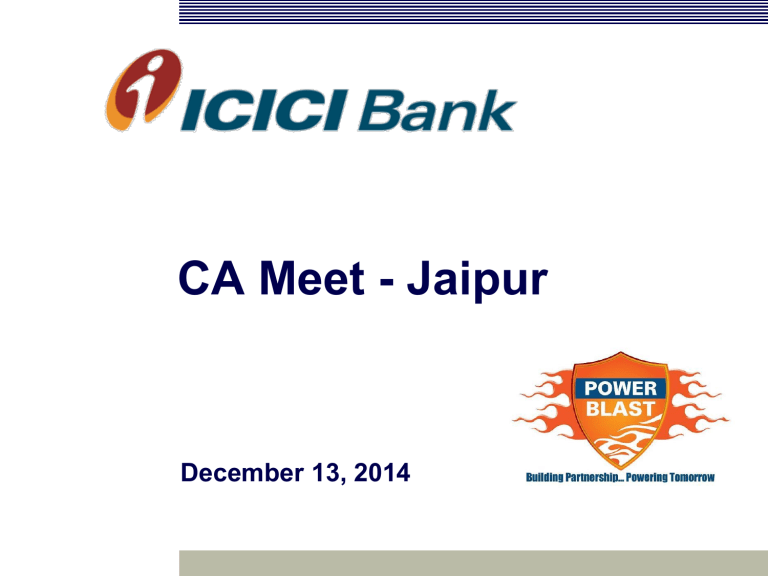
CA Meet - Jaipur
December 13, 2014
2
Global economic environment
Global economy: growth remains uneven
US
• GDP growth at 3.9% in Q3-CY2014 1 (CY2013: 2.2%)
• Update on QE
• End to monthly bond purchases by the Fed
• Fed will continue to reinvest proceeds
• Low interest rates for “considerable period” indicated
Eurozone
• Growth remains muted with large economies facing challenges
•
Deflation concerns persist; ECB reduced interest rates in Jun & Sep 2014
China
• Moderation in GDP growth to 7.3% y-o-y in Q3-
CY2014 (>9.0% levels in 2011 & 2012)
3
1.
Based on seasonally adjusted annualized quarterly
GDP growth
Global monetary policy
US
• Fed ends quantitative easing
• However, interest rates likely to remain low for considerable period
US
Eurozone
• Interest rates continue to remain at very low levels
• Long term refinancing operations to continue till
June 2016
Japan
• Persistent deflationary conditions; QE increased from ¥60 trillion - ¥70 trillion to about ¥80 trillion each year
Accommodative global monetary policy likely to continue
4
5
Key global developments to monitor
Trends in global growth; developments in Euro area
Timing of rate increases by the US Federal Reserve
Growth trends in China
Geopolitical developments
6
India: long term growth potential
7
India: strong long term growth fundamentals
Favourable demographics
Healthy savings & investment rates
Key drivers of growth
Rising per capita income
Rural India-high growth potential
High potential for infrastructure development to support economic growth in the long term
8
Favourable demographic profile
1,432
840
840
1,053
1,053
A young population with median age of 25 years
1,501
Rising share of working age population
• Addition of around 12 million to the workforce every year for next five years
• Working age population to exceed 50% of total population in 2025
Dependency ratios to remain low till 2040
9
Healthy savings & investment rate
~25%
Savings rate
~37%
~30%
~25%
Investment rate
~38%
~35%
FY2003 FY2008 FY2013 FY2003 FY2008 FY2013
Investments driven primarily by domestic savings
Strong domestic demand
Per Capita GDP (USD)
840
749
1,053
7
1,432
1,509
1,501
2005 2013
Rising per capita GDP accelerating domestic demand
10 Source: IMF
Revival in consumption growth…
% Y o Y
10.0%
9.0%
8.0%
7.0%
6.0%
5.0%
4.0%
5. 2%
8. 7% 8. 5%
PCE
9. 4%
7. 2%
Long term average
8. 7%
9. 3%
7. 4%
5. 0% 4. 8%
5. 7%
Private consumption expenditure (PCE) growth was below long-term average of 7.2% YoY; moderate pickup seen in H1-2015
11 Source: MOSPI
...likely to drive passenger vehicle sales
• Historically, passenger vehicle (PV) sales are seen to track
PCE growth, albeit with a lag
• Domestic car sales grew by 9.5% in November 2014 driven by lower fuel prices and continued relief in excise duty
12 Source: CEIC
13
Trends for rural India
(% )
100
Agriculture
28.6
80
20.0
60
40
20
0
FY2000
* ICICI Bank estim ates
51.4
Share in rural NDP
Industry
FY2005
37.3
23.9
38.8
Services
FY2010*
41.7
27.5
30.7
• Over 700 mn people spread across 600,000 villages
• Share of industry and services in rural economic growth now higher
Rural demand to be a growth lever
2011 - 12
2009 - 10
2004 - 05
1999 - 00
Monthly per capita expenditure
INR CAGR growth (%)
Rural
1,430
Urban
2,630
Rural
16.5
Urban
15.1
1,053
559
486
1,985
1,052
855
13.5
2.8
9.2
13.5
4.2
10.7
1993 - 94 286 464
Estimates of the consumer expenditure survey conducted by
NSSO for 2011-12 show that growth in monthly per capita expenditure in rural India has exceeded that in urban India for the first time since economic reforms began in early
1990s
14 Source: MOSPI
15
India: recent developments
16
India: structural concerns being addressed
Earlier concerns
• High level of fiscal deficit and domestic current account deficit
• Persistent high levels of inflation
•
Market volatility; sharp movement in
Recent developments exchange rate
• Reduction in fiscal deficit from 5.7% in
FY2012 to 4.6% in FY2014
• Current account deficit has narrowed significantly from 4.8% in FY2013 to 2.1% in
Q2-2015
• CPI inflation has moderated from an average of 9.5% in FY2014 to 5.5% in Oct
2014
• Improvement in capital flows
17
Continued optimism due to strong election mandate
S&P raised outlook for India from ‘negative’ to
‘stable
Several agencies have revised India’s growth forecasts upwards in the range of 5.5%-6.0% for
FY2015
18
Recent actions
Other reforms being considered
Measures by the Government
• Complete deregulation of diesel prices
• Ordinance relating to coal block deallocation
• Approval of new domestic gas pricing policy
• Gas pricing to be reviewed every six months beginning April 1, 2015
• Launch of ‘Make in India’ campaign
• Land acquisition reforms
• Labour reforms
• Introduction of goods and services tax
(GST)
• Liberalisation of insurance sector
19
India: economic outlook
GDP growth in the range of 5.5%-6.0% for FY2015
March-2016 CPI inflation at 6.0%-6.5%
Anticipation of rate cut by RBI in early 2015
20
In summary
Improvement in growth outlook for the Indian economy
Retail sector expected to benefit from improved macro economic outlook and policy initiatives
India: Growth gathering momentum
GDP grow th (% YoY)
8.0
6.0
4.0
2.0
0.0
FY2015: 5.5-5.7% target; further acceleration expected over the next few years
21
Source: MOSPI, ICICI Bank Research
RBI has maintained a pause on rates
(% )
10.0
9.0
8.0
7.0
6.0
5.0
4.0
3.0
Repo (Policy) rate Cash Reserve Ratio
RBI has maintained pause on policy rates since January-2014
22
Source: RBI, ICICI Bank Research
23
Real estate sector
Real estate & construction account for ~12% of GDP
3.0
0.0
(% )
9.0
6.0
Share in GDP
Real etstate services and ow nership of dw ellings Construction*
* includes residential and non-residential construction
24
Source: MOSPI, ICICI Bank Research
Residential and non-residential construction have high interlinkages with other sectors
Output multiplier*
3.0
2.4
1.8
21-sector average (1.83)
1.2
0.6
0.0
• “output multiplier” refers to change in total output in economy in response to rise in 1 unit of exogenous demand for a sector’s output
** construction includes residential, non-residential and other construction *** excluding railways
Construction sector has strong inter-sectoral linkages leading to a high employment generation potential.
For instance, the employment multiplier for residential construction sector is ~3
25
Source: NCAER, ICICI Bank Research
Growth in house prices has come off
20
15
10
5
0
(% YoY)
30
25
RBI House Price Index GDP grow th (RHS)
(% YoY)
8.0
7.0
6.0
5.0
4.0
3.0
The growth in house prices has slowed down to catch up with the erstwhile fall in GDP growth trajectory
26
Source: RBI, ICICI Bank Research
Overall affordability has remained static
Affordability
30
20
10
0
Property Value
(INR lac)
60
50
40
Annual income* (RHS)
(INR lac)
12
10
8
2
0
6
4
(* Income of an average property buyer)
Affordability calculated as the ratio of property value to annual income
Affordability of property by households has remained largely static over the last few years
27
Source: HDFC, ICICI Bank Research
28
Flow of funds into the real-estate sector
Share of physical savings in total savings has risen
(% )
80
70
60
50
40
30
20
Proportion of total household savings
Financial saving Physical saving
While overall household savings have declined since FY2011, the share of physical savings (which includes real-estate) has increased
Financial savings (as % of GDP) remained static at ~7.0% even in FY2014
29
Source: MOSPI, ICICI Bank Research
Property a predominant investment avenue for households
15
10
5
0
(% of total investment)
35
30
25
20
Investment of urban households by asset
* The study was conducted in 2011
According to an RBI-NCAER survey*, investment in property has taken priority over gold, deposits and equities for an average urban household
30
Source: NCAER, ICICI Bank Research
Credit-penetration in the sector remains very low
M ortgage debt-GDP ratio
(% )
100
80
60
40
20
0
India’s mortgage-debt to GDP ratio at 9% is one of the lowest in the world, suggesting scope for further penetration
Access to formal credit in India remains limited
31
Source: National Housing Bank (NHB), ICICI Bank
Research
FDI inflows into the sector have declined recently
25
20
15
(USD bn)
40
35
30
10
5
0
Total FDI
Share of construction development in FDI (RHS)
7
6
5
4
3
2
1
0
(% )
10
9
8
2010-11 2011-12 2012-13 2013-14 Q1 FY2015 * FY2014
Sectoral distribution of FDI equity inflow s*
6.2%
5.4%
5.0%
9.2%
Services (financial & non-financial)
Construction development^
Telecommunications
Automobile industry
Share of construction development in FDI equity inflows has been declining
32
^ defined as townships, housing and built-up infrastructure
Source: DIPP, MOSPI, ICICI Bank Research
33
Policy initiatives to support the sector in this context
In the FY2015 Union Budget, the Government announced a number of initiatives to support the sector
• INR 70.6 bn allotted for 100 smart cities
• INR 80 bn allocated for rural housing schemes
• Relaxations made in FDI in realty
• Tax incentives given on home loans
• Necessary incentives and a conducive tax regime for REITs
• Banks permitted to issue bonds in order to finance longterm credit to infrastructure and affordable housing segments
34
Real Estate in Jaipur
35
Executive Summary
• Jaipur is expected to become a mega city by 2025 with a population of 10 million people covering an area of about 800 sq km.
• Jaipur residential real estate market is driven by a 60:40 mix of investors and end users respectively.
• Maximum supply and absorption in the Jaipur market falls in the price bracket of INR 3,000 – 3,500/sqft.
• Most preferred configuration in terms new launches and absorption for the residential units has been the 3-BHK segment.
l
Infrastructure Growth
Metro Rail Network
• One of the biggest growth stimulators for Jaipur reality market
• Once operational, rates of residential property on and near the metro route are expected to flare up l Bus Rapid Transit Service (BRTS)
• Proposed to cater to city's growing traffic needs
• "North-South Corridor" from Sikar Road to Tonk Road, and an "East-
West Corridor" from Ajmer Road to Delhi Road l Ring Road
•
•
The proposed Ring Road project will be an arterial road connecting the major areas of Jaipur together
The Expressway will have investment zones for commercial as well as residential development on both the sides
Delhi Mumbai Industrial Corridor (DMIC)
•
•
•
A band of 150 km on both sides of the DFC has been chosen to be developed
DMIC
Nearly 39% of DFC passing through
Rajasthan ; plenty of opportunities for industrial establishment
About 60% of the State's area (locations like
Jaipur, Alwar, Kota and
Bhilwara ) fall within the project influence area of
DMIC .
Infrastructure Growth
Contd
..
l Dedicated Freight Corridor (DFC) running through Jaipur
• Rail corridor connecting Jawaharlal Nehru Port near Mumbai to Dadri near Delhi
• Will allow high-speed connectivity for high axle load wagons (25 tonnes) of double stacked container trains l Other Infrastructural Developments to boost demand of housing
• Knowledge cities : The Knowledge City North- near Chaup village.
Knowledge City South, will come up near the satellite town of Phagi
• Science-Tech City: Near Achrol on the Jaipur-Delhi highway . The location is opportune for investments in the higher education sector
• Several healthcare projects : like Reliance Medicity and Bombay
Hospital will promote medical tourism and employment
39
Sales Trends QoQ
16,000
14,000
12,000 new launches new launch absorption total absorption unsold inventories
10,000
8,000
6,000
4,000
2,000
0
Q4-2012 Q1-2013 Q2-2013 Q3-2013 Q4-2013 Q1-2014 Q2-2014 Q3-2014*
Source: PropEquity, ICICI Property Services Group.
Inventory Levels static at 12k – 14k
40
3000
2500
2000
1500
1000
500
0
Top Micro Markets in Jaipur (based on sales)
Total Absorption (Unit) Total Availability (Unit)
*Source: PropEquity, ICICI Property Services Group
Note: Residential data for 2014 (from Jan-2014 to August-2014)
l
Micro markets in Jaipur
l l l l The investors are willing to invest in the areas developing along the ‘spokes’ around the center of Jaipur. Following are the top 10 micro markets in Jaipur.
Ajmer Road
• Attracting investors from Delhi NCR and witnessing the development of integrated townships
• The occupancy rates are currently around 30%
Patrakar Colony
• Close to Mansarovar colony & Mansarovar Metro station
• Situated around 8 kms from the airport
• The ticket size lies in the range of 20-80 lacs
Tonk Road
• Builders are betting big on this area due to its proximity to Pratap Nagar
• The second most active micro-market in terms of absorption with 312 units being absorbed in the first 7 months of 2014
Micro markets in Jaipur
l Mahindra World City
• Joint venture by Mahindra & Mahindra with RIICO, the Mahindra City, spreads across 3,000-acres
• Divided into two zones- one zone being the IT zone and the other zone being dedicated to Export industries like Gem stones, handicrafts etc.
• Located on NH-8 and well connected to the Kandla Port in Gujarat
• Jaipur master plan has planned to develop the social and residential infrastructure such as housing facilities, healthcare facilities, educational institutions, etc. for a holistic living environment l The Jagatpura micro-market
• 25 residential projects coming up in this area
•
•
Located around 6 kms from Malviya Nagar
The ticket size of in this area lies in the range of 30-40 Lacs
Micro markets in Jaipur Continued
l Vaishali Nagar
• Offers a healthy mix of residential, retail and commercial development
• Low-rise floors as well as bigger projects by renowned local developers
• Residential units in this region are priced in the range of INR 3,000 -
6,000/sq ft l Sikar Road
•
•
An industrial belt that witnesses some residential projects by local developers. It is located along the Delhi Bypass connecting the heart of
Jaipur to the Vishwakarma Industrial Area
Close to Vidyadhar Nagar and its good connectivity through the Bus
Rapid Transit Service (BRTS) system.
• This micro-market has the average ticket size (2 BHK) falling in the range of 30 – 35 Lacs.
Micro markets in Jaipur
Continued l l l
Kalwar Road
• The proposed Jaipur- Jodhpur mega highway project is expected to bring more traction and focus to this area
• The residential projects are priced in the range of INR 2500 - 3300 / sq ft
Durgapura
• Is densely populated residential area ,having one of the best proximity and connectivity to the major commercial/retail hubs of Jaipur
• Lies along the Tonk Road with the airport only a kilometer away and
Durgapur Railway Station lying within the area
Sanganer
•
•
Jaipur is served by an International Airport, which is situated in its satellite town of Sanganer, at a distance of 10 km from city center and offers sporadic service to major Domestic and International locations.
The economic development is fuelled by proximity to airport
45
Key conclusions
India’s growth trajectory is on an upturn
Real estate sector a critical driver of the growth story
Interest rates could be supportive if inflation eases
Stability in Rupee to support India’s recovery
Overview
#1
N/W
ICICI Bank Overview
•
Largest private sector bank in India
•
Largest branch network among private sector banks supplemented with large ATM network
•
Over 25 million customer accounts
•
Strong capital base with CAR of 17.41% with
Tier 1 ratio of 12.75% at September 30, 2014
•
Among Top 60 banks in the world by market cap
•
Global presence in 18 countries
Retail Distribution
Distribution
A strong Retail base..
Serviced through…
Total Customers
NRI customers
> 25 mn
> 1 mn
Branches
ATMs
3,815
11,739
HNI customers
Salary Customers
> 0.40 mn
> 11 mn
Employees
Mobile
Banking
> 65,000
Internet Banking 5.2 mn
•
Retail deposit account for 70% of total domestic deposit
2.5 mn
•
CASA ratio at 43.7% at September 30, 2014
•
1.75 mn New customer accounts opened at September 30, 2014
•
Larger Pre-qualified customer base, across all lending products.
Technology
Key initiatives during recent years
Leveraging social networking platforms
Tab banking
Supporting customer service
& cost efficiency
Mobile banking: next generation apps across domains
24x7 touch banking: facilitating day-today transactions
Redesigned & customized website
Comprehensive solutions: online tendering, electronic toll collection
Leveraging mobility, digitisation and innovations in payments technology
Tab
Banking
TAB Banking
•
25000 Tabs across India led to 25000 additional touch points
•
Seamless integration with auto loans will ensur faster turnaround time and conversion.
•
Field Investigation and Valuation in Auto Loans through TAB
•
About 35-40% of the savings accounts opened every month are sourced using tab banking
Tab Banking for hassle free account opening
50

